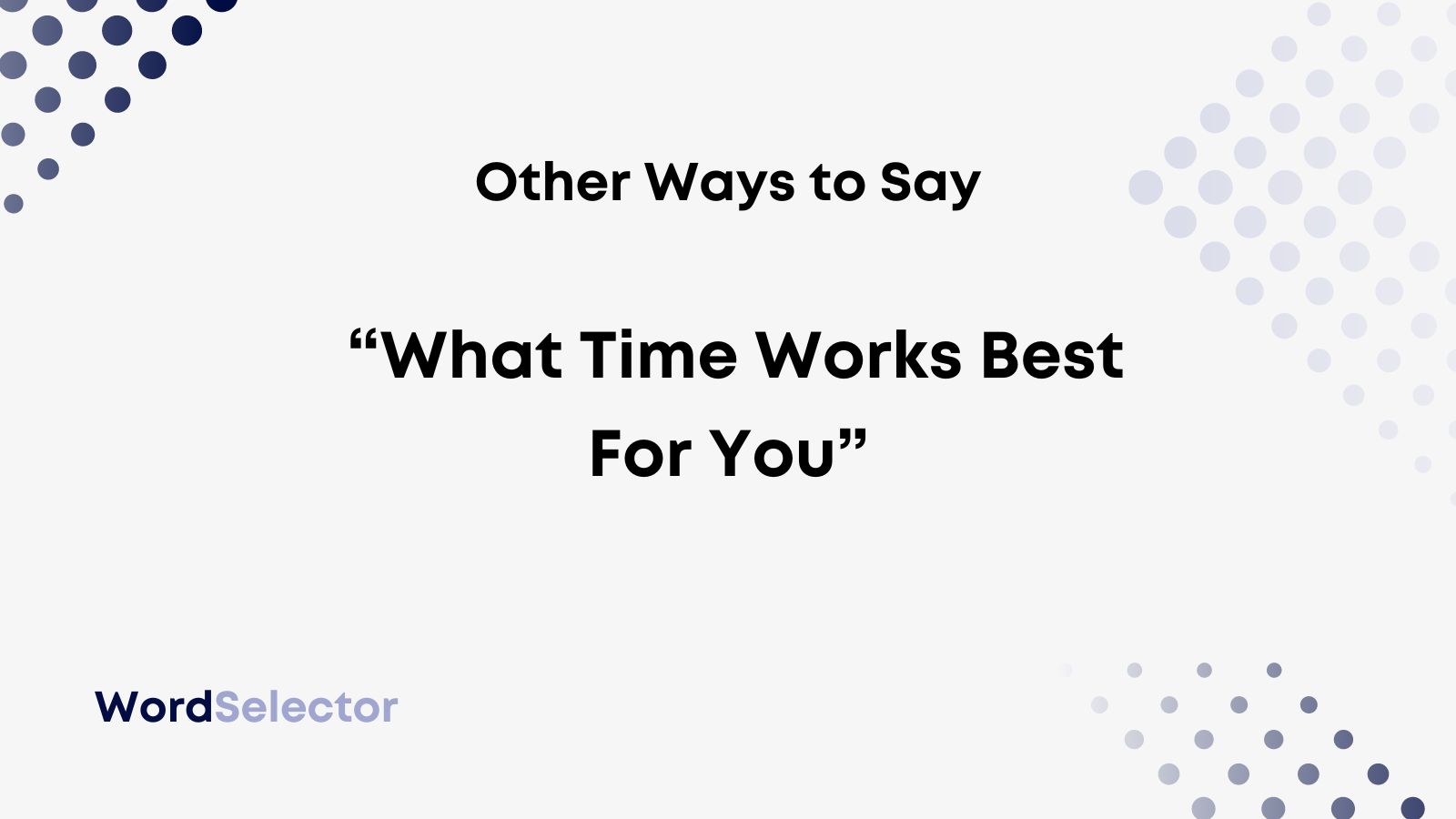Before setting a meeting time, you’ve got to ensure it works for the other party.
A simple question like “what time works best for you” goes a long way. But is it the only question that works here?
This article will explain how to ask “what time works best for you” in an email. It’s always good to know the most professional ways to ask for a convenient time.
Other Ways to Say “What Time Works Best For You”
- Can you please tell me your preferred time?
- When can we set this meeting up?
- Please inform me of a suitable time
- What time would be most convenient?
- Do any specific times work well for you?
- Let me know the time that suits you best
- I’d appreciate it if you could share the most suitable time
- Do you have a preferred time in mind?
- I’m flexible, so I’m happy to work around you
- Is there a particular time that suits you?
- When is a good time for you to meet me?
- Let’s find a convenient time for our meeting
- I’m happy to work around your schedule, so please suggest a time
KEY TAKEAWAYS
- “What time works best for you” is useful, but it’s not the most confident phrase.
- “Can you please tell me your preferred time?” is a great formal question to set up a time.
- Try “when can we set this meeting up?” for a more informal question.
Read on to learn another way to say “what time works best for you.” We recommend reviewing both the formal and informal options to give you an idea of what to expect in different contexts.
Alternatively, skip to the final section to learn more about the phrase. We’ve explained whether it’s correct and how to use it in emails.
Can You Please Tell Me Your Preferred Time? (Formal)
For a formal way to say “what time works best for you,” you can rely on this phrase. “Can you please tell me your preferred time?” is professional and respectful.
It shows you’re open to suggestions because you have a more flexible schedule.
Feel free to use this when contacting clients. It shows you’re willing to work based on their timings rather than yours.
Generally, this is a polite way to show that you care about your clients. It’s great to use if you’re trying to get in their good books and show them that they’re more valuable than they realize.
Here’s a helpful email sample to show you how it works:
Dear Katie,
Can you please tell me your preferred time before we set up this meeting? I’d like to work around you if possible.
Best,
Sam Ryder
When Can We Set This Meeting Up? (Informal)
You can use “when can we set this meeting up?” as a more informal question. It works best in conversational or friendly emails to colleagues.
Let’s imagine you’re trying to meet with a coworker. You might want to discuss a few changes taking place in your company.
Well, that’s great! It shows you’re interested in building a relationship and teamwork. However, you need to ask when works for them before you set it up.
After all, they might be busier than you. It’s worth asking this simple question to find out what they say.
This email sample should help you understand more about it:
Hi Michelle,
When can we set this meeting up? I think it’s better that you choose the time, as you are busier than me.
Yours,
Duncan Bannatyne
Is It Correct to Say “What Time Works Best For You”?
It is correct to say “what time works best for you.” It’s a great question to include in formal emails because it shows you’re willing to work around someone’s schedule.
However, it’s a bit unconfident because it doesn’t give you a chance to suggest a time. Instead, it leaves the timings up to the other party (which could make things more difficult for you).
Here’s an email sample to show you when it works:
Dear Mr. Young,
What time works best for you to sort this meeting out? I’d like to hear your end of the deal.
All the best,
Sam Walker
You can also use either of these variations:
- What time works for you?
- What time is best for you?
They both show that you’re asking someone when a time is more convenient for them.
You can also extend the original phrase slightly. This might help you to make it sound more personal or friendly.
For instance:
- Let me know what time works best for you.
- Please let me know what time works best for you.
- Just let me know what time works best for you.
Finally, we want to touch on using “what” or “which.”
“Which time works for you” implies you have selected a few times for someone to choose from.
“What time works for you” implies you’re asking for the most suitable time without providing a list.

